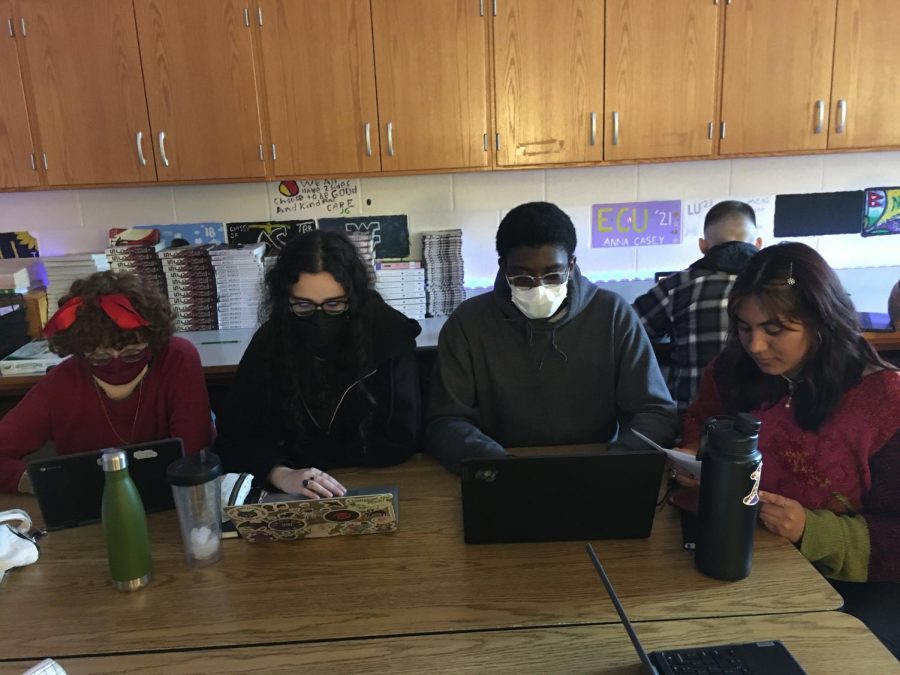Are Tuscarora’s Seniors Ready for College?
“Are post COVID teens ready for college?” Look up this question on Google and there are over 180 million results: news articles, studies, testimonials, and videos, all trying to find an answer. But what does Tuscarora’s graduating class think?
“Sometimes I don’t feel ready for college,” said Mounira Njinjie, a senior at Tuscarora, “I feel like COVID took away some of the best experiences of high school, like getting into the habit of being responsible.” Many Tuscarora students experienced this feeling of losing out on time to work on their study skills and habits. “I definitely think a lasting effect for me [of] online learning is procrastination,” mentioned senior RJ Evans. “In online learning… you could turn stuff in late and I think that kind of stuck and became the new norm.”
For some students, like Evans and Njinjie, the experience of COVID and online learning impacted these general skills, but also specific classes. “I feel like [COVID] really impacted my French and my English… after being online for a year, my French deteriorated…” Njinjie explained. For seniors Lauren Wallo and Michaela Workman, math was the most difficult subject to learn online. “It was hard for us to ask questions… so we would leave the lessons with a lot of questions, which I don’t think is good for math,” explained Workman.
Standardized testing across America has revealed the gaps in knowledge caused by online learning. According to an article published by the New York Times, students across the country are struggling, especially in math. There were big declines in math scores, especially in grades four, eight, and in high school calculus courses. “In math departments across the country, professors and administrators say more students need more support. Professors talked of whittling their syllabuses and lowering their expectations.”
Israel Bienda, a senior at Tuscarora who plans to take a gap year after high schools thinks that online learning had a mixed impact on preparing them for college: “Doing online learning helped me grow personally, but not academically… I recognized a few things about myself because I had so much time alone to think.” Like Evans, Bienda thinks their procrastination got worse. “One struggle I might have in college is the conceptualization of deadlines… [online learning] made that a lot worse.”
On the other hand, some students feel that online learning helped get them ready for college. “I thought it was a positive thing because it taught me how to be disciplined and keep my attention on the screen,” explained Workman, “I thought it was really good practice… in terms of staying organized with assignments.” For some students, the extra responsibility they were given during COVID helped them develop the skills other people had trouble maintaining.
For Wallo, online learning was a great experience. “My grades stayed pretty much the same… compared to everybody else, I was thriving.” It gave Wallo more time to work on hobbies like painting and other forms of art. When thinking about college, online learning helped her decide to potentially pursue a minor in sculpture. “I’m excited for college,” she mentioned, “it’s supposed to be fun.”
Tuscarora’s teachers also saw the impact of COVID and online learning on students. “Kids who were self-motivated did a lot better during online learning than kids who [needed] prompting from the teachers…” said Megan Domingue, one of Tuscarora’s math teachers. “… having four kids who went through [online learning] myself, I saw that different kids handled it differently.” Domingue has continued to notice problems with students taking math classes, but thinks that “… each year it gets better.”
Other students struggled more with paying attention to Google Classroom Meets and online lessons. “A lot of times the students that were at home were not engaged at all,” recalled Lisa Francis, an English teacher at Tuscarora. When asked what students might struggle with in the transition to higher education Francis responded that she thinks “… attention span and tackling difficult projects are going to be really difficult… Being self-starters on those difficult projects and being able to overcome difficulties is going to be hard.”
During online learning, points off for late work and concrete due dates were sometimes nonexistent. This has caused students to continue to ignore due dates late into the quarter, often turning in all of their assignments on the last day. In college, turning in late assignments will normally lead to a 0 on the assignment. “The county’s [policy is to] accept work whenever. That’s not the reality of college,” asserted Riley Clark. As a history teacher at Tuscarora before, during, and after COVID, Clark had a first hand view of the impacts of online learning. When asked about the biggest struggles this graduating class may have when transitioning to college, Clark believes they will be “Procrastination… and not being able to communicate effectively with professors…”
Luckily, teachers and students alike are trying to help get everyone ready for college. Workman’s advice for seniors: “… build good study habits now so that you already have them established when you go, so you don’t need to learn how to study on top of more difficult classes and [a] different style of learning…” This sentiment was repeated by Njinjie and Wallo as well, with Wallo saying students should “[Prioritize] figuring out how to study that in a way that’s best for [you]… just figuring out your own brain and how you work.”
When asked how teachers can help students get prepared for college, Evans thought back to his junior year: “I think the biggest thing would be educating the juniors… I wish they would kind of sit us down at the beginning… and walk you through the process to educate you a little bit.” He remembers coming back to school senior year and feeling overwhelmed by all the decisions he had to make, many of which he could have started preparing for the year prior. Evans appreciates his English teacher’s lessons about getting ready for college, “Mr. Blair does a great job of that and I just wish more teachers would do that because not everyone is fortunate enough to have him as a teacher.”
Other students have opposing views on how teachers could start to get them ready. Workman wants teachers to give students more freedom on assignments to reflect a college environment, explaining that she thinks “… more stuff should be up to us because… we should know how to get our assignments done, and if we don’t, then it’s our grade that’s gonna suffer.” On the other hand, Bienda wants teachers to “break down” projects for students and help them work through more difficult assignments.
Teachers of seniors are trying to walk this fine line. Francis says that in her class, she teaches students how to “… use time wisely and chunk out bigger projects”, while also “…trying [to do less] while the students take ownership of their education more.” This split between some students wanting more freedom on assignments, and others needing more help, is a difficult divide to straddle.
Domingue believes that the best skill to teach students is perseverance. “One of the things I’m always trying to work on for myself is giving kids a chance to struggle,” she said, “I think that is the big thing in college… you need to know that it’s not going to come fast and you’re [going to] have to work through it and to not give up.”
Roslyn is a first year staff writer for The Pack and in grade 12. She runs cross country during the fall and enjoys rock climbing, reading, and discussing...





